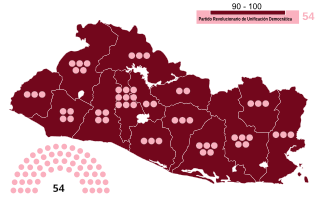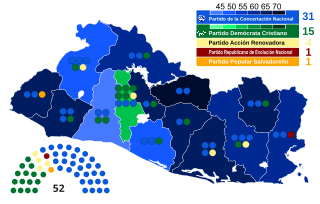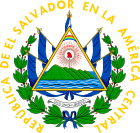
The Christian Democratic Party is a Salvadoran political party. From 2011 to 2012, the party was renamed to Party of Hope before reverting to the Christian Democratic Party. The PDC has been led by Reinaldo Carballo since 2023.

Presidential elections were held in El Salvador on 20 February 1977.

Legislative elections were held in El Salvador on 14 March 1976. The result was a victory for the ruling National Conciliation Party, which was the only party to contest the elections due to a boycott by the opposition as a result of massive electoral fraud.

Legislative elections were held in El Salvador on 10 March 1991. The result was a victory for the Nationalist Republican Alliance, which won 39 of the 84 seats. Voter turnout was 44.7%.

Legislative elections were held in El Salvador on 12 March 1978. The elections were boycotted by all but one of the opposition parties, resulting in an easy victory for the ruling National Conciliation Party, which won 50 of the 54 seats.

Legislative elections were held in El Salvador on 10 March 1974. The result was a victory for the National Conciliation Party, which won 36 of the 52 seats whilst the National Opposition Union (UNO) won only 15. However, the election was marred by massive fraud and the official vote counts were not published.

Legislative elections were held in El Salvador on 8 March 1970. The result was a victory for the National Conciliation Party, which won 34 of the 52 seats. However, the election was marred by massive fraud. Voter turnout was just 41.6%.

Legislative elections were held in El Salvador on 10 March 1968. The result was a victory for the National Conciliation Party, which won 27 of the 52 seats. Voter turnout was just 36.6%.

General elections were held in El Salvador between 26 and 29 March 1950. The result was a victory for Óscar Osorio in the presidential election, and his Revolutionary Party of Democratic Unification in the legislative election.

Legislative elections were held in El Salvador in March 1952. The result was a victory for the Revolutionary Party of Democratic Unification, which was the only party to contest the elections as the opposition Renovating Action Party claimed that they were rigged.

Legislative elections were held in El Salvador in March 1954. The result was a victory for the Revolutionary Party of Democratic Unification, which was the only party to contest the elections as the opposition Renovating Action Party claimed that they were rigged.

Legislative elections were held in El Salvador on 24 April 1960. The result was a victory for the Revolutionary Party of Democratic Unification, which won all 54 seats after the Central Electoral Council had disqualified the candidates of the Renovating Action Party in seven of fourteen constituencies.

Legislative elections were held in El Salvador on 8 March 1964. The result was a victory for the National Conciliation Party, which won 32 of the 52 seats.

Legislative elections were held in El Salvador on 13 March 1966. The result was a victory for the National Conciliation Party, which won 31 of the 52 seats.

Presidential elections were held in El Salvador on 4 March 1956. The result was a victory for José María Lemus of the Revolutionary Party of Democratic Unification, who received 95.2% of the vote.

Presidential elections were held in El Salvador on 5 March 1967. The result was a victory for Fidel Sánchez Hernández of the Party of National Conciliation, who won 54.4 percent of the vote.

Presidential elections were held in El Salvador on 20 February 1972. The result was a victory for Arturo Armando Molina of the Party of National Conciliation (PCN), who received 43% of the vote. However, the election was characterised by massive fraud. The PCN had faced a strong challenge from left- and right-wing opposition, and as a result had tried to rig the election by holding the presidential elections two weeks before the legislative election to ensure that if Molina failed to pass the 50% mark, the Legislative Assembly would still be under PCN control to approve him as president. Despite their attempts to stuff ballot boxes, it looked for a while as though José Napoleón Duarte of the opposition National Opposition Union had been victorious after the Central Election Board in San Salvador issued a statement that Duarte had won by around 6,000 votes. However, this was followed by a three-day news blackout, after which a revised set of figures was announced giving a narrow victory to Molina, meaning that the Legislative Assembly would choose the president. The opposition walked out of the vote, resulting in Molina being elected by 31 votes to zero.
The 1979 Salvadoran coup d'état was a military coup d'état that occurred in El Salvador on 15 October 1979. The coup, led by young military officers, bloodlessly overthrew military President Carlos Humberto Romero and sent him into exile. The National Conciliation Party's firm grasp on power was cut, and in its place, the military established the Revolutionary Government Junta of El Salvador (JRG). The junta was composed of two military officers and three civilians.

Death squads in El Salvador were far-right paramilitary groups acting in opposition to Marxist–Leninist guerrilla forces, most notably of the Farabundo Martí National Liberation Front (FMLN), and their allies among the civilian population before, during, and after the Salvadoran Civil War. The death squads committed the vast majority of the murders and massacres during the civil war from 1979 to 1992 and were heavily aligned with the United States-backed government.
The National Opposition Union was a Salvadoran political coalition which existed from 1972 to 1979. The coalition was composed of the Christian Democratic Party, the National Revolutionary Movement, and the Nationalist Democratic Union.











